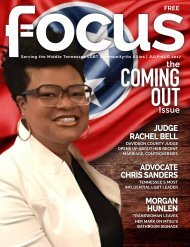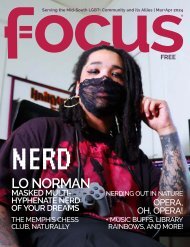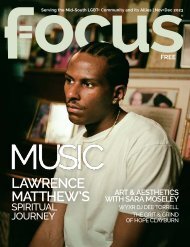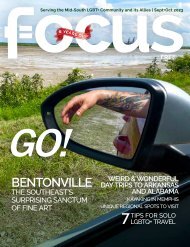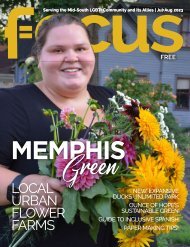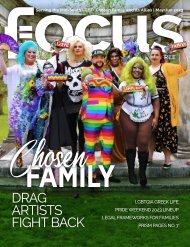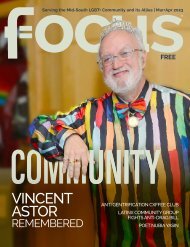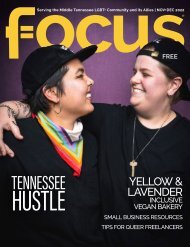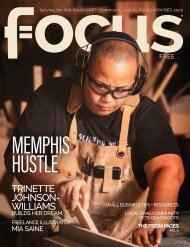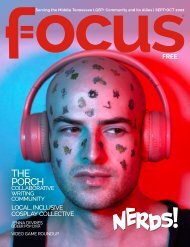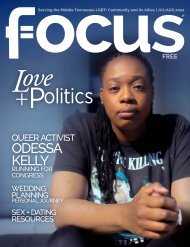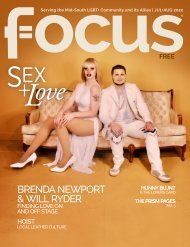2022 Issue 5 Sept/Oct Focus - Mid-South magazine
Nerds!
Nerds!
You also want an ePaper? Increase the reach of your titles
YUMPU automatically turns print PDFs into web optimized ePapers that Google loves.
Faith + Spirituality<br />
THIRD<br />
PLACES<br />
by Tiffany Day<br />
In the HBO show Somebody Somewhere, the beloved<br />
character Joel introduces the main character, Sam, to<br />
“Choir Practice.” Simultaneously place, community, and<br />
event, Choir Practice is a weekly, nighttime variety-show-<br />
esque gathering of mostly queer folx and misfits at a<br />
local church. Joel’s involvement as an active member of<br />
the church is their “in” to using the space; the name is<br />
a cover for their gathering. It’s through Choir Practice<br />
that Sam forms a deeper friendship with Joel and a new<br />
friendship with trans soil scientist, professor, and Choir<br />
Practice master of ceremonies, Fred Rococo. It's here<br />
that Sam starts singing again, and it’s where she (re)<br />
discovers a sense of place, belonging, and community in<br />
her Kansas hometown as she figures out her life after the<br />
loss of her sister.<br />
Choir Practice is reminiscent of countless other queer<br />
spaces, societies, and clubs in history, of those spaces<br />
that become a haven for their regulars. It’s a perfect<br />
example, too, of the sociological concept of a “third<br />
place:” a space where one gathers for purposes of<br />
community and social life that is sufficiently separate and<br />
distinct from the primary spheres of “first place” (home)<br />
and “second place” (work).<br />
The sociologist Ray Oldenburg coined the term in his<br />
1989 book The Great Good Place, , and in it he expounds<br />
a third place’s characteristics: it exists on neutral ground,<br />
it’s a social leveler—giving its patrons equal standing,<br />
the primary activity is conversation, it’s accessible and<br />
accommodating, it has friendly regulars and a low profile,<br />
the mood is playful, and it’s a home away from home.<br />
Third places, the “great good places,” offer their patrons<br />
novelty and perspective, raise spirits, and provide friend<br />
groups. They help fulfill humans’ needs for belonging.<br />
Coffee shops, clubs, parks, barber shops, bookstores, gay<br />
bars, nail salons, farmers markets, rec centers, churches,<br />
synagogues are all examples of possible third place spaces.<br />
Oldenburg writes about these spaces because he thinks<br />
there’s a “problem of place in America,” that our sprawling,<br />
barren-street suburbs and poorly designed cities make it<br />
difficult to establish and access third places, that American<br />
life has struggled to adapt and create other forms of<br />
“integral community” to replace what was lost with the<br />
42 Nerds! | focuslgbt.com




